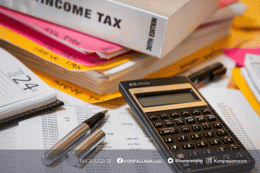Taxes are one of the important instruments used by the government in collecting revenue and maintaining a country's economic stability. As a fiscal policy instrument, taxes have a direct impact on economic activity, government revenue and resource allocation. Through the collection of funds from the public and companies, the government can finance public activities such as infrastructure development, education, health and others. The role of taxes is indeed numerous and fundamental, as it has a direct impact on the country's economy. In addition to having an important role, taxes also have challenges in its application. This article will discuss the role and challenges of taxes in maintaining economic balance and growth.
First, taxes as a source of revenue and financing for the government. The revenue obtained by the government through taxes comes from funds paid by the public. The collected tax funds are used by the government in the process of financing various programs and services that have been planned. Without sufficient tax revenue, the government will find it difficult to provide public services so that this will affect the balance or growth in various sectors. Therefore, stable tax revenue is important to maintain the sustainability of government and community activities.
Second, taxes for income and wealth distribution. Distributing income and wealth fairly in society is also an important role of taxes. Through the use of a progressive tax system, where the percentage of tax will increase along with the increase in income earned. This is the government's effort to reduce the economic gap between social groups. In addition, the revenue earned from progressive taxation is also used to finance social programs such as subsidies for the poor. This can certainly create economic stability and reduce social inequality.
Third, tax as an inflation controller. Through appropriate tax policies, the government encourages consumption and suppresses consumption to regulate the level of demand in the economy. Increasing tax rates or imposing special taxes on certain products can reduce people's purchasing power and encourage savings. On the other hand, when the economy experiences a downturn, the government can reduce fiscal incentives to the public to encourage spending and boost economic growth. So this shows that taxes have a role as a mechanism in controlling the rate of price growth.
Fourth, taxes as an influence on economic behavior. Taxes become a means for the government to encourage investment in certain sectors that are considered strategic for economic growth. For example, the government can provide tax intensive to companies that invest in technology or energy. With this, the government can create a conducive business climate so that economic growth can increase due to these economic behavioral factors.
The implementation of a tax system that has many roles in the economy certainly does not always run smoothly. There are a number of obstacles and challenges faced by the government in implementing taxes to maintain the stability of the country's economy. The challenges that occur are as follows:
1. Tax Collection and Enforcement
A key challenge facing the government is ensuring tax efficiency and enforcement. The government needs to ensure that all taxpayer elements fulfill their obligations in paying taxes and do not commit fraud. Because the income of tax payments will also affect the tax revenue obtained as well.
2. Changes in Tax Regulations
Tax regulations can change from time to time, this is in response to changes in government policies, economic conditions or social changes. This is certainly a challenge for the government to ensure that the tax system can remain relevant and fair to the community.
3. Tax System Complexity
The tax system is often complex with various rules and regulations that are quite complicated. This can certainly make it difficult for taxpayers, especially for those who cannot understand the tax system well. This problem is usually a gap for them not to pay taxes because they do not understand the system.
4. Tax Injustice and Inequality
Injustice and inequality in the tax system are also challenges faced by the government. Some taxpayers feel that the tax burden they bear is unfair. So sometimes many people protest because the amount of tax they have to pay is too expensive and inappropriate. This can lead to dissatisfaction and undermine public trust in the government.
The fundamental and important benefits of taxes are very influential in the country's economy. Taxes become an important asset in maintaining economic balance and growth through their role and function. In addition to the role, there are also challenges faced by the government. To overcome the challenges faced, the government needs to carry out tax reform, increase taxpayer awareness, increase transparency and fairness of the tax system. This aims to achieve the role of taxes in economic stability.
Author : Muchammad Adam Wildan










